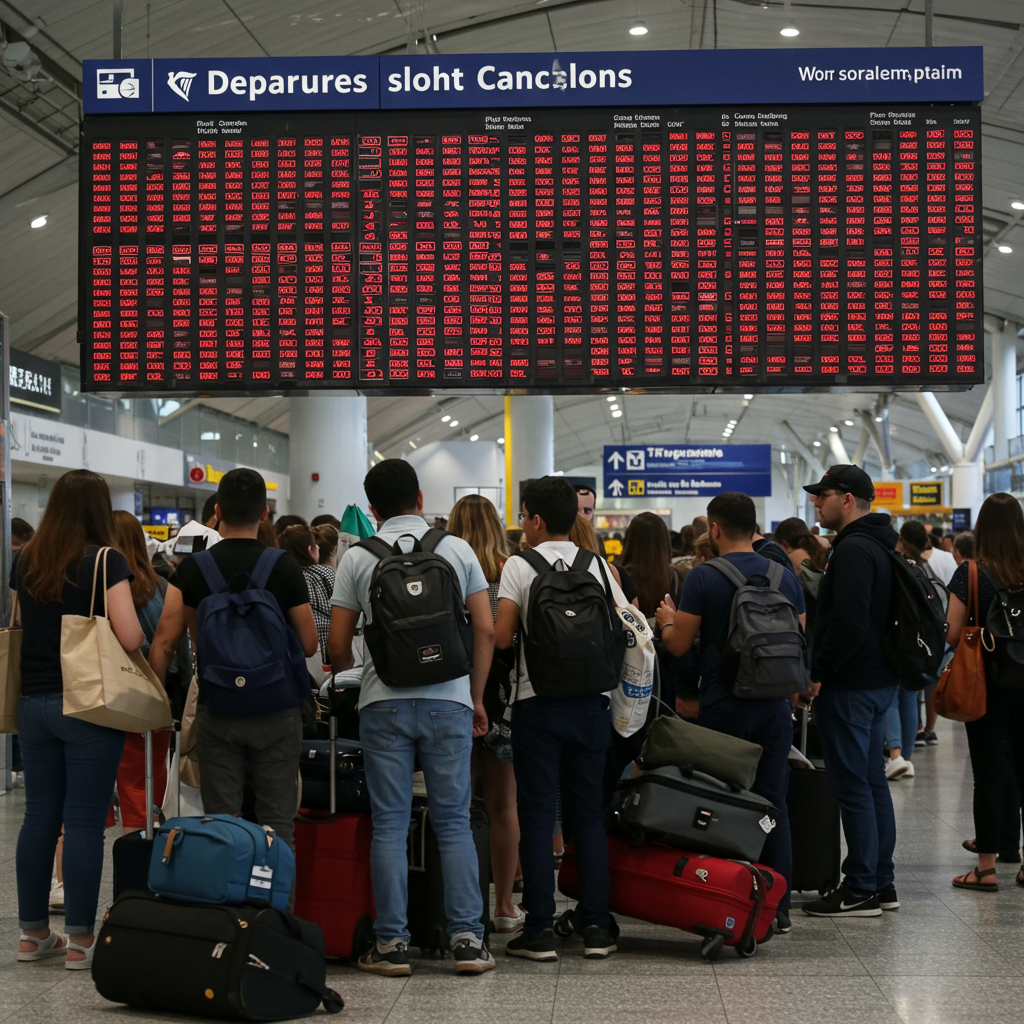Tens of thousands of travelers faced significant disruption this week as a French air traffic control (ATC) strike forced major flight cancellations across Europe. Budget airline ryanair confirmed it was severely impacted, leading to widespread changes in holiday plans for many passengers flying during the peak season. This industrial action not only grounded flights heading to and from France but also caused chaos for aircraft simply passing through French airspace.
Strike Impact: How Many Flights & Passengers Affected?
Ryanair, one of Europe’s largest carriers, announced it had to cancel more than 170 flights directly because of the two-day strike staged by French air traffic controllers. These cancellations impacted the travel arrangements of over 30,000 passengers, many of whom were setting off on their summer holidays. The strike took place on Thursday and Friday, causing immediate and widespread disruption throughout the European air travel network.
French aviation authorities, anticipating the impact, had requested airlines significantly reduce their flight schedules at key airports. On Thursday, roughly a quarter of flights were cancelled at Paris’s main airports (Charles de Gaulle, Orly, and Beauvais), while Nice airport saw half of its flights cancelled. Disruption was expected to escalate on Friday, with Paris airports facing a 40% reduction in their planned flight volume. Other airlines, including easyJet, also reported hundreds of cancellations, and IAG (British Airways parent company) indicated they would use larger aircraft where possible to mitigate the impact.
Why French Air Traffic Controllers Are Striking
The industrial action was primarily called by two French unions, including the UNSA-ICNA union. Their decision to strike stemmed from several key grievances related to working conditions. Concerns raised by the unions included significant staffing shortages, ongoing management issues within the air traffic control system, and opposition to the planned introduction of a controversial clock-in system for controllers. Talks held with France’s civil aviation authority (DGAC) earlier in the week failed to resolve the dispute, leading to the planned walkout going ahead.
Beyond France: The Impact on European Overflights
A significant point of contention highlighted by affected airlines, particularly Ryanair, is the disruption caused to flights that do not even originate or terminate in France. Due to the strike closing off sections of French airspace, flights merely passing over the country en route to other destinations across Europe were also forced to reroute or were cancelled. This impacted passengers traveling between countries like the UK and Greece, or from Spain to Ireland, despite their journeys having no planned stop in France. Ryanair argues this situation, where domestic industrial action affects international transit flights, is particularly unfair and unnecessary.
Ryanair CEO’s Strong Reaction and Call for EU Action
Michael O’Leary, the outspoken chief executive of Ryanair, voiced severe criticism of the strike and its impact on travelers. He accused the striking air traffic controllers of “holding European families to ransom,” emphasizing the timing during the busy holiday season. O’Leary stated that cancelling or delaying flights that simply pass over France “makes no sense and is abundantly unfair on EU passengers going on holidays.” He specifically called upon European Commission President Ursula von der Leyen to intervene. His urgent plea included demands for concrete “urgent action” from the EU to ensure minimum service levels are maintained during ATC strikes and, crucially, to protect flights using French airspace from being affected by domestic industrial action.
Industry and Government Responses
The strike also drew condemnation from government officials and aviation bodies. French Transport Minister Philippe Tabarot publicly criticized both the unions’ demands and their choice to strike during such a vital travel period, labeling the situation “unacceptable.” France’s civil aviation authority, the DGAC, had proactively asked airlines to reduce flight schedules across several national airports in anticipation of the disruption. Airlines for Europe (A4E), a leading aviation association representing various European carriers, described the strike’s timing and impact as “intolerable,” warning of severe consequences for holiday season travel plans. EasyJet, another low-cost carrier heavily impacted, expressed its “deep disappointment” and urged a swift resolution to the dispute.
What This Means for Travelers
For passengers affected by the French ATC strike, the immediate concern is the disruption to their travel plans. Airlines like Ryanair have been advising passengers to check their flight status frequently for the latest updates. Options for affected travelers typically include rebooking onto alternative flights or seeking refunds. The timing of the strike at the very start of the European summer holidays amplified its impact, catching many families and individuals heading out for their annual breaks. While the numbers are significant, Ryanair did provide some context, noting that despite these cancellations and other disruptions (including previous issues in the Middle East), they still operated over 109,000 flights in June, meaning the strike affected less than 1% of their total monthly volume. Nevertheless, for the tens of thousands directly impacted, the disruption is significant.
The Bigger Picture: Calls for EU ATC Reform
The recurring nature of air traffic control strikes in Europe, particularly in France, has led to persistent calls for systemic reform. Ryanair CEO Michael O’Leary has been a leading voice advocating for European Union-led changes. He argues that the current system is too susceptible to localized industrial action, causing disproportionate, continent-wide disruption. O’Leary’s proposed EU reforms focus on two key areas: ensuring ATC services are adequately staffed, especially during peak hours and the initial wave of daily departures, and implementing mandatory measures to prevent national strikes from affecting overflights. He contends that these relatively straightforward changes could eliminate the vast majority (Ryanair claims 90%) of ATC-related delays and cancellations, providing a more reliable and predictable air travel experience for millions of European passengers and families. Industry bodies like A4E echo these calls for greater resilience and efficiency in European airspace management. The current French strike serves as another stark reminder of the need for long-term solutions to manage increasing air traffic demand while minimizing the fallout from industrial disputes.
Frequently Asked Questions
Why did French air traffic controllers go on strike?
French air traffic controllers staged a two-day strike primarily over grievances concerning working conditions. The unions involved cited issues including staff shortages, ongoing management problems, and opposition to a proposed new clock-in system. Talks with the civil aviation authority failed to resolve these disputes before the strike began.
How many Ryanair flights and passengers were affected by the strike?
Ryanair stated that the French air traffic control strike forced them to cancel more than 170 flights. These cancellations significantly disrupted the travel plans for over 30,000 passengers, many of whom were traveling during the start of the busy European summer holiday season.
What did Ryanair propose to the EU to prevent future strikes?
Ryanair CEO Michael O’Leary publicly called on European Commission President Ursula von der Leyen to implement urgent reforms to EU air traffic control. His key demands included ensuring ATC services are always fully staffed and implementing measures to protect flights simply passing through a country’s airspace (overflights) from being disrupted by domestic strikes.



